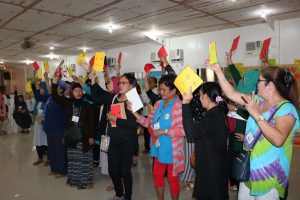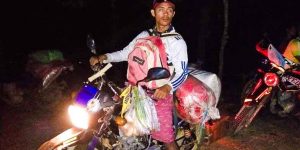Fearless Mothers’ Resounding Plea:
The Support We Need in Dinagat Islands
“Nangandam man mi sa iyang pag-abot, dili lang mi andam sa gihatag na kahasol sa bagyo.”
[We were prepared for her [Odette] arrival, but we were not ready of the typhoon’s inconvenience.”]
These were the exact words of Gina Apelias, who, along with her neighbors in Garcia, Libjo, Dinagat Islands, survived from the wrath of typhoon Odette on the 16th of December, 2021 but were traumatized by Odette’s damages especially that their houses and planted vegetables were destroyed.
In an interview, Gina shakingly said that they were not ready for Odette’s aftershock, as she sees it as their downfall from the difficulties encountered during the COVID-19 pandemic and considering their daily struggles.
“Nanghangyo mi nga maapil mi dire sa mga hinabang ug naay manghatag.” [Hopefully, we will be included if there is any Assistance to be provided.] she emphasized.
According to the latest situational report of Dinagat Islands, courtesy of the provincial operations center, there are 30,341 total affected households in the province with a total population of 128,954. In the municipality of Libjo alone, there are 5,208 affected households in total composed of 18,051 people. In the 2021 housing survey, there are 4,853 houses in Libjo. After Odette, the record states that 3,407 are partially damaged and 1,466 are totally damaged.
The first wave of relief assistance was provided to all the municipalities in the province but in Libjo, only 5 out of 16 barangay received assistance distributed by the provincial government as of January 7 excluding Garcia in the list, where Gina and her family are situated.
According to the report and in terms of response, the local government along with non-government, individuals, and private institutions have provided food and non-food items, medicine, hygiene kits, and shelter materials directly to the survivors.
On January 5-9, 2022, ECOWEB has extended its assistance through a survivor and community-led response approach and conducted participatory action learning in crisis in two barangays namely Rosita and Llamera. Imelda Garcia has 489 households who are like Gina, waiting for help and further emergency and humanitarian intervention.
Gina, a mother of four with three grandchildren living with her, recalls her family’s experience during Odette’s second landfall in Dinagat Islands bringing very destructive typhoon-force winds and sporadic heavy rain. She witnessed how it battered their house and uprooted their roof then flew off spirally.
She narrated how they used their hand-woven mat to cover their bodies from hazardous flying objects hurled by the strong winds. She shared how her two grandchildren tightly held her as they ran towards a sturdy post and hid safely.
She expressed that all of them experienced unending panic attacks in that three-hour or more horror brought by typhoon Odette. She also blurred out while observing the surroundings turned into pitch gray – hopeless as nothing will be left for them. As much as she wanted to save other belongings, she said that she is still fortunate enough to save her family and cautiously assist her neighbors who are crawling for survival.
Gina said that because of this destruction, they were not prepared emotionally and financially. They do not know where to ask for help to rebuild their houses and recover from the situation. She added that whenever cars pass by their area, they wave at them and ask for food or something to drink.
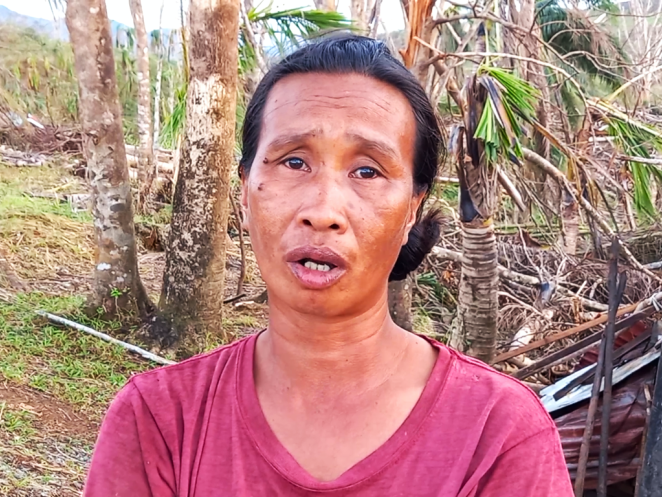
“Nakadawat nami ug mga ayuda pero usahay lisod gyud ang tabang makasulod dinhi sa amo. Ug naay mga sakyanan manglabay, muduol intawon mi kay mangayo ug hinabang kay perti gyud namong lisodra dinhi. Miskan pang-konsumo ug pampalit lang ug trapal para sa among balay, malipay na kaayo mi.” said Gina.
[We already received assistance but sometimes, help in our place is very limited. Whenever cars are passing by, we approach them to ask for help because our situation here is very difficult. Just for our consumption and [money] to buy tarpaulins for our houses, we will be very happy.]
The ECOWEB team deployed in Dinagat, is one of those in mobile whom they waved. They ran and seemed happy to approach as the team stopped to assess their situation.
“They need to be heard especially about their situation and status after Odette. We saw how difficult it is for them to live in makeshift houses and it is always raining in the island. There are a lot of affected families and communities, we cannot cater them all. We came to help and support two severely affected areas, unfortunately, they were not part of it. But we stopped to hear and listen to them.” said Renefe Padilla, ECOWEB Project Coordinator for the Typhoon Odette Response in CARAGA.
Gina, along with her neighbors, has expressed to the team that they already received kilos of rice and other goods from the local government and other agencies. However, they need additional food for consumption as the donated goods can aid them for just a few days. She also underscored their need to have financial assistance to buy plastic sheets or tarpaulins (trapal) to have temporary shelters.
“Nahurot na ang gipanghatag na bugas, nagkaon nalang mi ug udlut sa lubi. Sa pagkakarun, nanghangyo ko sa akong pamilya sa Balungisan, Payao, Zamboanga Sibugay ug sa mga tawo nga gusto mutabang sa amo na maapil mi sa ayuda ug matabangan mi sa among kalisod dire labaw na sa pagpalit pang-konsumo ug makatukod sa among miskan pampalit lang ug trapal.” she added.
[We ran out of rice; we just ate a handful of heart of coconut palm. Right now, I am asking my relatives in Balungisan, Payao, Zamboanga Sibugay, and the people who want to help us during these difficult times, to include us in any assistance for our consumption and to buy tarpaulins for our houses.]
Gina is also worried about her parents’ situation in Zamboanga Sibugay, specifically her mother who is ill and is suffering from physical repercussions due to her sickness. She cannot even contact them as signal and internet connectivity have not yet been restored on the island.
As of the moment, Gina and her family try their best to garden to have food on their tables for the next months. “Bahalag wala mi tarong makaon karun ug naguba ang among atop, mangita ko pamaagi nga makakaon akong pamilya ug makatulog mi ug tarong hangtod sa makabangon mi balik aning pagsulay.” she added.
[Even if we do not have enough food to eat at the moment and our roof was torn away, I will find ways for my family to have something to eat and sleep better until we bounce back from this trial.]
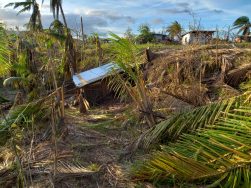


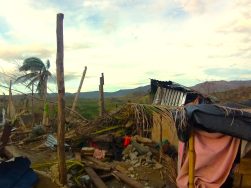
Photo: Damage of houses and coconut trees in Garcia, Libjo, Dinagat Islands after the destruction of Typhoon Odette.
It was meant to happen.
Meanwhile, it is a different yet horrifying story for Ana Gregorio, 65, and a mother of a person with a disability. When she heard about the news, she made sure that her family will evacuate early. They went on a higher ground far from their house which is also near the riverside. But they were not safe.
“Nahadlok mi kay basin dili mi masalbar labaw na nga naa koy anak na disabled. Lisod gyud kaayo among sitwasyon dinhi kay wala mi tarong mapuy-an ug wala sad mi panginabuhian. Nakita na nako nga nitaas na ang tubig sa sapa halos taga-liog na kusog pa ang hangin, ang among gipundohan naguba sad.” she said.
[We were so afraid that we might not be saved especially that I have a disabled child. Our situation here is very difficult because we do not have a decent place to live in and we do not have a livelihood. I have seen that the water in the river has risen almost neck-level and the wind is still strong, even the place where we evacuate was destroyed.]

On the day of Odette’s rage, Ana narrated how she was so flustered seeing tin sheets and coconut leaves flying, and soil from the side of the mountain slowly eroding. When they were running away from the post, she saw her daughter, Jonalyn, 32, running with them slowly. Ana was calling her husband to assist their daughter, but Jonalyn was hit by a rusty half-length galvanized iron sheet scarring and bruising her lower leg badly.
“Nagdagan man akong anak padulong sa amo. Sige na ug singgit akong bana para makadagan sad siya ug paspas pero nahagbungan na gyud siya ug sin. Akong bana nahadlok ug nalooy galantaw. Nagkadugo naman iyang paa ug wala mi mahimo. Pagka-ugma gidala namo siya sa ospital para matambalan.” she emotionally shared.
[My daughter was running towards us. My husband was always shouting so that she could run faster, but she was already hit by a tin roof. My husband was scared and looked [at our daughter] pitifully. Her leg was bleeding and we couldn’t do anything. The next day we took her to the hospital for treatment.]
Despite the discomfort and pain Jonalyn has endured, she tolerated it and never gave up until the next day. Staying in a place where everything seemed deserted and only crying voices are heard, she wanted that time of despair to end even if she knew this was meant to happen.
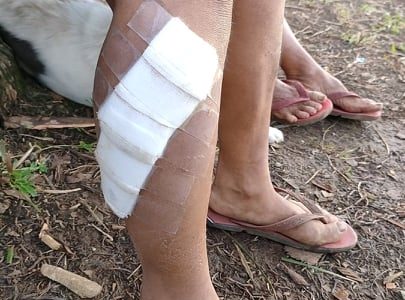
“Si mama ra akong kauban sa balay. Wala koy igsoon…isa ra ko. Walay tabang… ako mama ug papa ra. Disabled pa gyud ko. Dako kaayo akong samad. Ngutngot akong tiil dayun gitahi sa doctor.” although stuttering while expressing her thoughts, but Jonalyn’s aura was hopeful that she will recuperate from the wound.
[My mother is the only one with me at home. I don’t have a sibling…I’m the only one. No help…only my mother and father. I am also disabled. The wound is very big. I felt thenumbness but it was then stitched by the doctor.]
Photo: Jonalyn’s three-week wound covered in medical plaster.
Ana, her mother, said that volunteer doctors from Davao helped their family to unstitch Jonalyn’s wound as it needs to be cleaned to avoid any infection. Barangay leader in Llamera, Libjo also helped them to buy pain reliever medicines and antibiotics from the doctor’s prescription, for free. Aside from the medicines for the healing of the wound, they need to buy Jonalyn’s maintenance for her head.
Thankfully, they received the PHP 500 monthly supplemental allowance for disabled persons from the government and were able to buy the needed medicines.
“Naglisod mi karun kay dili kaya ang 500 pesos para sa tambal sa akong anak tapos kailangan pa namo mangita pagkaon ug kwarta pangtukod sa among balay. Nanghangyo intawon mi na matabangan mi ninyo na maayo among balay ug makapalit tambal. Tabangi mi na matukod ang among payag na gamay kay wala nagyud nabilin.” she said.
[We are having a hard time now because 500 pesos can’t sustain my daughter’s medicine and we still have to buy food and money to build our house. We would like to ask [anyone] if they can help us fix our house and buy medicine. Help us build our small hut because there is nothing left.]
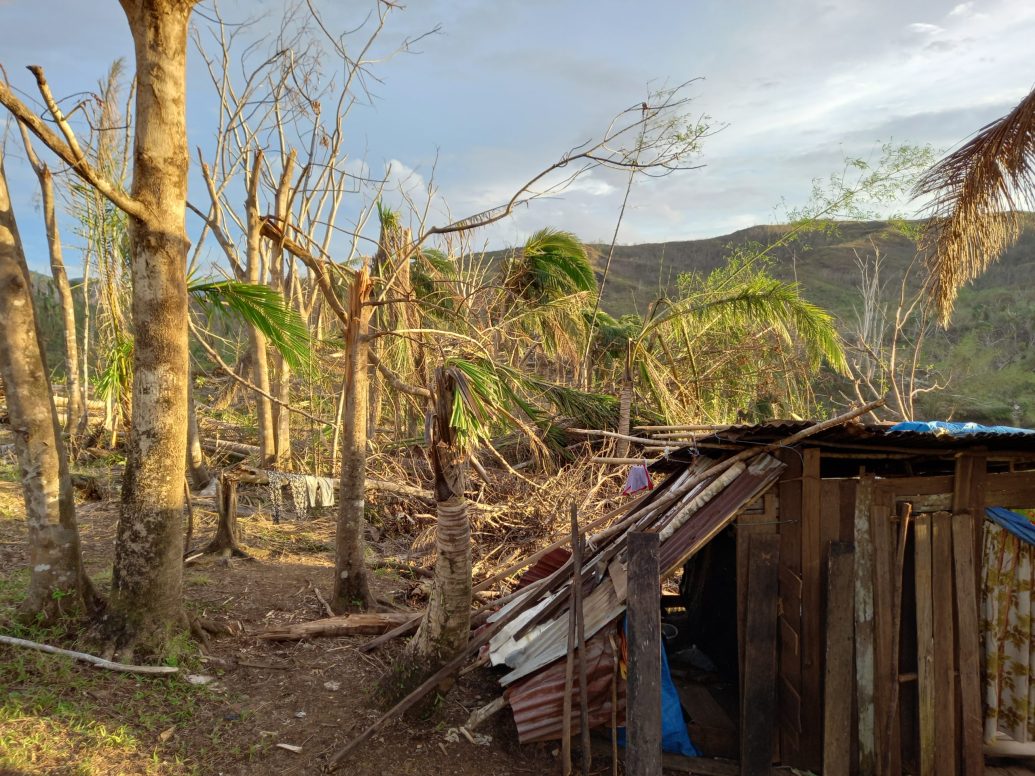
Photo: Ana Gregorio and her family’s small house in Garcia, Libjo which is made of recycled tin sheets and collected lumber patched to have something to sleep in.
Age is never a struggle.
Further along, according to reports from previous experience of disasters that hit the Philippines, older people are disproportionately affected by the disaster and more likely to be among the fatalities or casualties due to challenges encountered at the onset of disasters, including typhoons.
However, age is never a struggle to Condrada Pelicano, 84 and a mother of 9, as she saw her vulnerability as her driving force to live another day after Odette’s onslaught.
“Niadto ko sa akong anak para didto makisilong. Pagkusog sa hangin na murag luparan ang balay, adto napud mi sa unahan. Nakita nako nga nangatumba na ang mga balay sa kakusog sa hangin. Naningkamot gyud ko ato, pero lisod gyud kaayo. Napadpad gyud sa hangin akong balay. Pero mas maayo nang nasalba nako ako kaugalingon una kauban ako mga anak.” she narrated.
[I went to my son’s house to take shelter. When the wind almost blew off the house, we went ahead. I could see that the houses were already collapsing due to the wind’s strong force. I tried [to survive], but it was really hard. My house was blown away by the wind. But it’s better that I saved myself first along with my kids.]
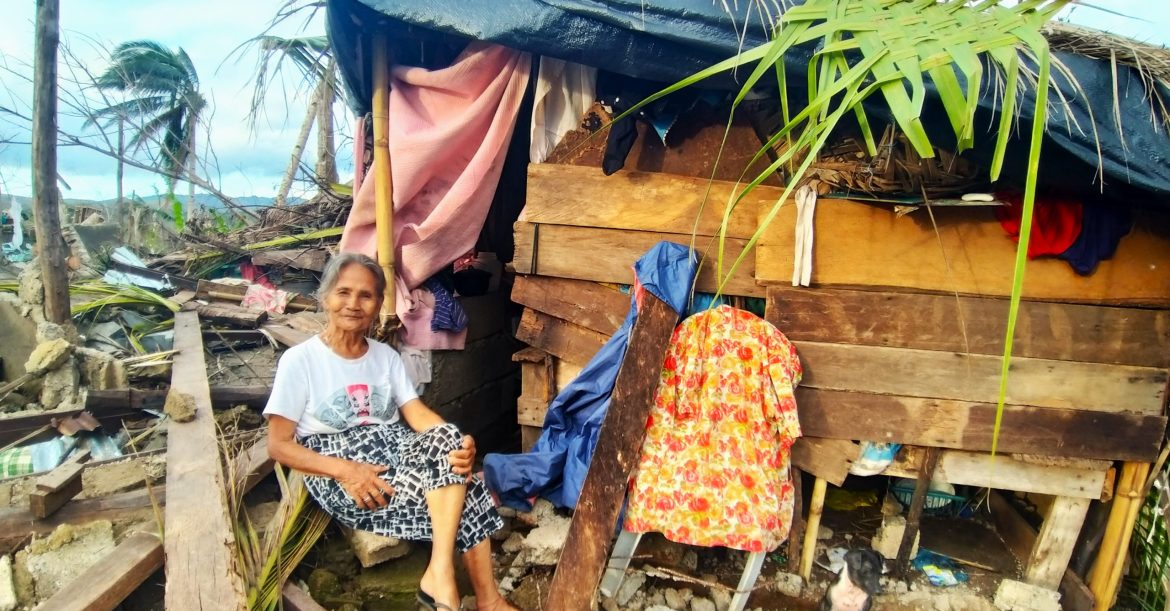
During the interview, Condrada expressed that her house is not made of lightweight materials. She was so certain that there will
be a lot to save from it but she never expected that it demolished her entire house including her son’s.
Amid the destruction, she was still having this positive aura and endearing energy. She shared that she was a farmer and said that no farmer will ever give up on planting until they see something growing. The same with her thoughts of not giving up until they recover.
However, Condrada thinks that they cannot build back unless there will be available resources to start anew. She exclaimed that they need help to at least support them financially to buy shelter materials and food, and they will commence the next steps. She believes that the island itself is still recovering so they can only do less as of this moment.
“Gitabangan ko ug tukod sa akong anak nga gamay na payag gamit ang mga nalagpot na sin ug kahoy para naay matulugan. Manghangyo ko ug tabang miskan unsa inyong ihatag na kailangan namo karun. Pang gasto sa akong balay para pangtukod ug pangkaon, malipayon namong dawaton.” she said.
[My son helped me to build this small hut using the retrieved and recycled tin sheets and lumber to have a place to sleep in. I ask for your help on whatever help you can give with what we need now. Expenses for rebuilding my house and to buy food, we would gladly accept it.]
Condrada already received kilos of rice from the local government unit, but she said that she only has the senior citizen indigent pension as her allowance to spend for her daily expenses and medicines. She hoped that the government will not overlook the needs of the older people affected by typhoon Odette. It is imperative that they are prioritized, recognized, and needs are addressed.
These mothers fearlessly strived for their families’ survival and recovery. They believed that they have the capacity to cross raging tides just for their families to not suffer during these trying times. They only wish and hope to let their story be heard by concerned agencies and organizations that are willing to extend a helping hand in Garcia, Libjo.
“Listening to these mothers stories and featuring them will be the means for others to be informed about their real needs. It will open an avenue for other people to see their situation, and help them through a community-led approach.” said Renefe Padilla, Project Coordinator.
ECOWEB also enumerated recommendations of priorities that needed to be provided in the island intended for emergency response and recovery of the province. However, all agencies should consider that the needs of the people not just in Libjo but to the rest of the municipalities on the island, may change over time along the course of intervention. Hence, ECOWEB and CLEARNet promote community-led approaches and conduct community action planning that would be meeting the real-time needs of the communities.
Help us raise funds and let us reach these communities for their early recovery. If you wish to donate and help the affected
families, click the DONATE BUTTON below.

